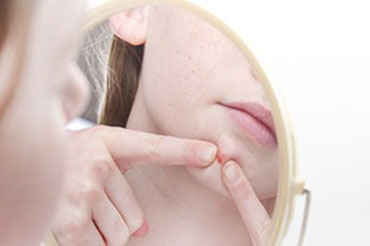 Many people have heard of skin picking, but not many realize that it is a disorder that falls under the category of the term body-focused repetitive behavior.
Many people have heard of skin picking, but not many realize that it is a disorder that falls under the category of the term body-focused repetitive behavior.
Body-focused repetitive behavior (BFRB) is an umbrella term for impulse control behaviors involving compulsively damaging one’s physical appearance or causing physical injury. BFRBs are repetitive, injurious, and non-functional habits that cause significant distress or impairment.
The main BFRB disorders are:
- Dermatillomania – skin picking
- Trichotillomania – hair pulling
- Trichophagia – hair nibbling
- Trichotemnomania – hair cutting
- Dermatophagia – skin nibbling
- Onychotillomania – nail picking
- Onychophagia – nail biting
- Morsicatio Buccarum – cheek biting
- Morsicatio Labiorum – inner lip biting
- Morsicatio Linguarum – tongue biting
- Rhinotillexomania – compulsive nose picking).
Research has indicated that BFRBs affect about 1 out of 20 people. Trichotillomania alone is believed to affect 10 million people in the United States.
Causes and Onset of BRFBs
The cause of BFRBs is yet unknown. Emotional variables may have a differential impact on the expression of BFRBs. Researchers are investigating a possible genetic component and many people suffering from a BFRB have a parent who has the same condition or an anxiety disorder. BFRBs typically begin in late childhood or in the early teens.
BFRBs are among the most poorly understood, misdiagnosed, and undertreated groups of disorders, largely because patients go to great lengths to hide the problem. For example, someone pulling their hair will deliberately choose areas of the scalp that will allow a comb-over of their hair to hide the affected area. Skin picking is often even easier to hide with makeup, such as a heavy foundation.
Psychotherapy and Treatment for BRFBs
Amongst mental health providers such as therapists and psychologists, BFRB disorders are not generally considered obsessive-compulsive disorders. Treatment for BRFB typically includes psychotherapy. Often it will also include behavior modification therapy, medication, family therapy and/or couples counseling. There are a wide variety of type of psychotherapy used to treat BRFBs including behavioral therapy, cognitive behavioral therapy, psychodynamic therapy, and mindfulness approaches. It is important to note that research has not identified any particular treatment as superior to another in treating any form of BFRBs.
One therapy that some BFRB patients have found beneficial is emotion regulation (ER). This model works on the premise that BFRBs are triggered by negative emotions and subsequently reinforced by alleviation of unpleasant affect. The emotions addressed with this approach are impatience, boredom, frustration, and dissatisfaction. The belief is that people with BFRBs are particularly susceptible to these emotions primarily because they demonstrate maladaptive coping skills, poor planning styles, unrealistically high standards, and an unwillingness to relax.
Marriage Counseling and BRFBs
When a spouse suffers from a BRFB, their partner often takes on behavior that is codependent in the same manner as someone married to an alcoholic. As the codependent partner attempt to control the BRFB behavior, the relationship deteriorates as both parties develop deep resentment. It is generally the best practice to begin couples therapy as soon as possible if a partnership contains a person with a BRFB. Additionally, it would be best to have a licensed marriage counselor who has extensive experience h both BRFBs and codependency. This would most likely be a Licensed Marriage Family Therapist with certifications as an addiction counselor.
Dr. Randi Fredricks, Ph.D.
Author Bio
Dr. Randi Fredricks is a leading expert in the field of mental health counseling and psychotherapy, with over three decades of experience in both research and practice. She holds a PhD from The Institute of Transpersonal Psychology and has published ground-breaking research on communication, mental health, and complementary and alternative medicine. Dr. Fredricks is a best-selling author of books on the treatment of mental health conditions with complementary and alternative medicine. Her work has been featured in leading academic journals and is recognized worldwide. She currently is actively involved in developing innovative solutions for treating mental health. To learn more about Dr. Fredricks’ work, visit her website: https://drrandifredricks.com

References
Diefenbach GJ, Reitman D, Williamson DA (2000). Trichotillomania: A challenge to research and practice. Clinical Psychology Review. 20 (20): 289–309.
Flessner CA, Francazio S, Murphy YE, Brennan E. An Examination of Executive Functioning in Young Adults Exhibiting Body-Focused Repetitive Behaviors. J Nerv Ment Dis. 2015 Jul;203(7):555-8. doi: 10.1097/NMD.0000000000000327.
Grant JE, Leppink EW, Tsai J, Chamberlain SR, Redden SA, Curley EE, Odlaug BL, Keuthen NJ. Does comorbidity matter in body-focused repetitive behavior disorders? Ann Clin Psychiatry. 2016 Aug;28(3):175-81.
Grant JE, Mancebo MC, Mooney ME, Eisen JL, Rasmussen SA. Longitudinal course of body-focused repetitive behaviors in obsessive-compulsive disorder. Ann Clin Psychiatry. 2015 Aug;27(3):185-91.
Nakell S. A healing herd: benefits of a psychodynamic group approach in treating body-focused repetitive behaviors. Int J Group Psychother. 2015 Apr;65(2):295-306. doi: 10.1521/ijgp.2015.65.2.295.
Redden SA, Leppink EW, Grant JE. Body focused repetitive behavior disorders: Significance of family history. Compr Psychiatry. 2016 Apr;66:187-92. doi: 10.1016/j.comppsych.2016.02.003.
Roberts S, O’Connor K, Aardema F, Bélanger C. The impact of emotions on body-Focused repetitive behaviors: evidence from a non-treatment-seeking sample. J Behav Ther Exp Psychiatry. 2015 Mar;46:189-97.
Woods DW, Houghton DC. Evidence-Based Psychosocial Treatments for Pediatric Body-Focused Repetitive Behavior Disorders. J Clin Child Adolesc Psychol. 2016;45(3):227-40. doi: 10.1080/15374416.2015.1055860. Review.
